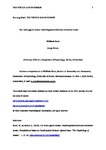The virtue gap in humor: Exploring benevolent and corrective humor.
| dc.contributor.author | Ruch, W | |
| dc.contributor.author | Heintz, Sonja | |
| dc.date.accessioned | 2020-04-08T13:04:35Z | |
| dc.date.available | 2020-04-08T13:04:35Z | |
| dc.date.issued | 2016 | |
| dc.identifier.issn | 2332-2136 | |
| dc.identifier.issn | 2332-2179 | |
| dc.identifier.uri | http://hdl.handle.net/10026.1/15549 | |
| dc.description.abstract |
The recent emergence of positive psychology gave rise to the idea to conceptualize humor from a “good character” perspective (Peterson & Seligman, 2004). Present constructs, however, show a “virtue gap”, and the two concepts of benevolent and corrective humor were developed to fill this gap. The former describes a humorous outlook on life that entails the realistic observations and understanding of human weaknesses (and the imperfection of the world) but also their benevolent humorous treatment. By contrast, corrective humor involves moral based ridicule; that is, the use of mockery to fight badness and mediocrity. Corrective humor, akin to satire, uses wit to ridicule vices, follies, abuses, and shortcomings with the intent of shaming individuals and groups into improvement. Participants (N = 340) filled in statements assessing the two virtue-related humor concepts, general sense of humor (subsample of n = 144), mockery, and 24 character strengths. As expected, benevolent humor showed positive correlations with most of the 24 character strengths, and uniquely related to the strengths of several virtues (justice, temperance, and transcendence) beyond general sense of humor. Corrective humor related most strongly to strengths of the virtues wisdom, courage, and justice, especially once mockery was controlled for. Thus, both constructs capture important virtue-related humor aspects over and above the sense of humor and mockery and are thus suitable for–at least partially–filling the “virtue gap” in humor research. They have the potential to pave the way for developing and investigating further humor constructs that meaningfully relate to strengths and virtues. | |
| dc.format.extent | 35-45 | |
| dc.language | en | |
| dc.language.iso | en | |
| dc.publisher | American Psychological Association (APA) | |
| dc.subject | 16 Peace, Justice and Strong Institutions | |
| dc.title | The virtue gap in humor: Exploring benevolent and corrective humor. | |
| dc.type | journal-article | |
| plymouth.issue | 1 | |
| plymouth.volume | 2 | |
| plymouth.publication-status | Published online | |
| plymouth.journal | Translational Issues in Psychological Science | |
| dc.identifier.doi | 10.1037/tps0000063 | |
| plymouth.organisational-group | /Plymouth | |
| plymouth.organisational-group | /Plymouth/Faculty of Health | |
| plymouth.organisational-group | /Plymouth/Faculty of Health/School of Psychology | |
| plymouth.organisational-group | /Plymouth/REF 2021 Researchers by UoA | |
| plymouth.organisational-group | /Plymouth/REF 2021 Researchers by UoA/UoA04 Psychology, Psychiatry and Neuroscience | |
| plymouth.organisational-group | /Plymouth/REF 2021 Researchers by UoA/UoA04 Psychology, Psychiatry and Neuroscience/UoA04 Psychology, Psychiatry and Neuroscience MANUAL | |
| plymouth.organisational-group | /Plymouth/Research Groups | |
| plymouth.organisational-group | /Plymouth/Research Groups/Plymouth Institute of Health and Care Research (PIHR) | |
| plymouth.organisational-group | /Plymouth/Users by role | |
| plymouth.organisational-group | /Plymouth/Users by role/Academics | |
| dcterms.dateAccepted | 2015-12-14 | |
| dc.identifier.eissn | 2332-2179 | |
| dc.rights.embargoperiod | Not known | |
| rioxxterms.versionofrecord | 10.1037/tps0000063 | |
| rioxxterms.licenseref.uri | http://www.rioxx.net/licenses/all-rights-reserved | |
| rioxxterms.licenseref.startdate | 2016 | |
| rioxxterms.type | Journal Article/Review |


